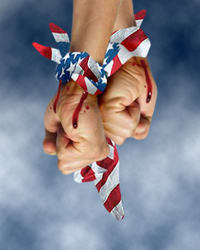The memo states that interrogation methods that cause severe mental pain do not amount to torture under U.S. law unless they cause "harm lasting months or even years after the acts were inflicted upon the prisoners." Initially, the CIA took the position that it could not confirm or deny the existence of this memo; it dropped that position after President Bush disclosed in September 2006 that the CIA had been operating detention centers overseas.
Two other newly obtained documents are requests by the CIA for legal advice on interrogation techniques.
The other two documents, from 2003 and 2004, are memos from the CIA related to requests for legal advice from the Justice Department. The 2003 memo shows that CIA interrogators were authorized by OLC to use torture practices known as "enhanced interrogation techniques." The memo also indicates that, for each session in which these techniques were used, the CIA documented, among other things, "the nature and duration of each such technique employed" and "the identities of those present." The documentation relating to the CIA's torture sessions, including the names of agents who participated, is still being withheld.
The 2004 memo shows that CIA interrogators were told that the Justice Department had concluded that certain interrogation techniques, including "the waterboard," did not constitute torture. The document also indicates that, after the Supreme Court ruled in June 2004 that courts can decide whether foreign nationals held in Guantánamo Bay were rightfully imprisoned, CIA interrogators were told to take into account the possibility their actions would ultimately be subject to judicial review.
The ACLU says:
"These documents supply further evidence, if any were needed, that the Justice Department authorized the CIA to torture prisoners in its custody," said Jameel Jaffer, Director of the ACLU National Security Project. "The Justice Department twisted the law, and in some cases ignored it altogether, in order to permit interrogators to use barbaric methods that the U.S. once prosecuted as war crimes."
..."While the documents released today do provide more information about the development and implementation of the Bush administration's torture policies, even a cursory glance at the documents shows that the administration continues to use 'national security' as a shield to protect government officials from embarrassment, criticism and possible criminal prosecution," said Jaffer. "Far too much information is still being withheld."





